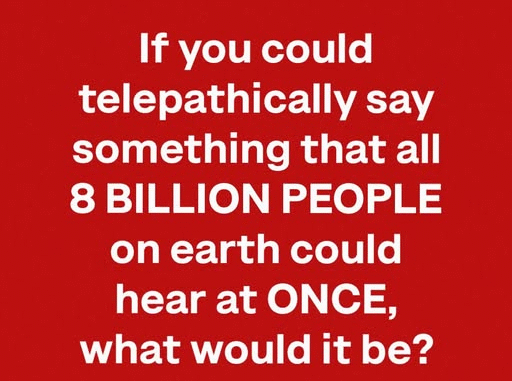
Imagine it: a single moment. A silent pulse across the planet. No microphones, no translators, no algorithms deciding who sees what. Just one thought — one sentence — transmitted directly into the mind of every living human being on Earth.
Eight billion people.
From a fisherman in the Java Sea to a student in Reykjavik.
From a mother nursing her newborn in Lagos to an astronaut floating above the atmosphere.
From a child playing in a refugee camp to a CEO in a high-rise boardroom.
All of them — you, me, everyone — hearing the same words at the same time.
If you had that power — just one message, heard by all — what would you say?
Would you warn?
Would you plead?
Would you inspire?
Or would you simply whisper something kind?
This question has quietly circulated online, in classrooms, and around dinner tables — not because it has a right answer, but because it forces us to ask: What do we truly believe matters?
“You Are Not Alone.”
That’s what I would say.
Not a command. Not a warning. Not a demand for change.
Just four words.
You are not alone.
Because in a world of 8 billion souls, more of us are drowning in loneliness than ever before.
A 2023 UN report declared loneliness a global public health crisis. In the U.S., over half of adults report being lonely. In the U.K., they’ve appointed a Minister for Loneliness. Teen suicide rates are rising. Elderly populations are isolated. Even in crowded cities, people go weeks without meaningful conversation.
We scroll, swipe, and share — but rarely connect.
And so, in that one universal moment, I wouldn’t preach about climate change (though it’s urgent). I wouldn’t scold about greed or war (though they destroy us). I wouldn’t even beg for peace (though we desperately need it).
I would simply say: You are not alone.
Because sometimes, that’s the only thing standing between someone and despair.
But Others Would Say Something Different
Some would choose truth.
“The climate is collapsing. We have ten years to act — and we’re still arguing about whether it’s real.”
Others would choose compassion.
“Every child deserves to go to sleep without hunger. Every parent deserves to feel safe. This is not radical — it’s human.”
Some would go smaller — more personal.
“I forgive you.”
“I’m sorry.”
“I see you.”
One man said he’d whisper:
“Your anxiety doesn’t define you. You’re doing better than you think.”
A teacher said:
“You matter — even if no one has told you that today.”
A teenager wrote:
“It gets better. I know it doesn’t feel like it, but I promise — it does.”
And then there’s the woman who said she’d simply say:
“We’re all trying.”
That’s the one that sticks with me.
We’re all trying.
We’re all carrying invisible weights.
We’re all fighting battles no one sees.
We’re all scared — of failure, of loss, of not being enough.
And yet, most of us keep going.
What If the Message Wasn’t Words at All?
Some say they wouldn’t speak — they’d feel.
They’d send a wave of pure empathy. A flood of understanding. Not a sentence, but a sensation:
“I know what it’s like to hurt. And I’m here with you.”
Imagine feeling, for one second, the collective warmth of every heart that’s ever loved, every hand that’s ever reached out, every stranger who’s ever smiled at you on a bad day.
Would that change us?
Would it soften our edges?
Would it make us pause before sending that angry text?
Would it stop a war?
Maybe not. But maybe — just maybe — it would make one person choose hope over hate.
So What’s the Point of This Thought Experiment?
It’s not about telepathy.
It’s about what we wish everyone knew.
It’s about the values we hold so deeply, we’d broadcast them to the entire species if we could.
It’s about realizing that in a world drowning in noise, the most powerful messages are often the quietest.
So if you had that moment — that one chance to speak to all of humanity — what would your message be?
Would it be:
“Stop. Breathe. You’re still here.”
“We’re more alike than we are different.”
“Please be kind — you never know what someone is going through.”
“You are loved.”
“We can fix this — together.”
Or would you, like me, simply say:
“You are not alone.”
Because sometimes, that’s enough.